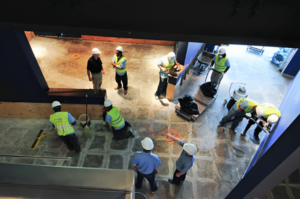
What are the Main Causes of Sewage Backups in Glenview, IL Homes?
A sewage backup is an unpleasant and hazardous problem a homeowner can experience in Glenview, IL. It causes significant property damage and poses serious health risks due to contamination and bacteria. In Glenview, IL, the seasonal storms and aging infrastructure can strain local drainage systems. So, sewage backups are more common than many realize. Understanding their root causes can prevent costly damage and maintain a safe home environment. Clogged or Blocked Sewer Lines A main cause of sewage backups in Glenview homes is a blocked sewer line. Over time, daily materials like grease, soap residue, food particles, and hair can build up inside your pipes and restrict water flow. When the blockage becomes severe, wastewater has nowhere to go but back inside your sinks, tubs, or basement drains. Regular drain cleaning and disposal of waste can prevent this common issue. Tree Root Intrusion Many older homes in Glenview rely on clay or cast-iron sewer lines and are particularly vulnerable to tree root intrusion. Roots grow toward sources of moisture naturally and can penetrate even tiny cracks in underground pipes. Once inside, they expand and block the flow of wastewater, while causing backups and potential pipe damage. Regular video inspections and root barrier systems can help detect and prevent this issue before it escalates further. Heavy Rainfall and Flooding Glenview’s weather conditions can be unpredictable, and during heavy rain or flooding, the municipal sewer system often gets overwhelmed. When this happens, excess water can push sewage back through your home’s drains in basements or low-lying areas. A sump pump or a backwater valve can protect your home from these storm-related sewage backups. Aging or Damaged Sewer Lines With time, sewer lines can deteriorate because of corrosion, changing soil, or natural wear and tear. Older infrastructure in Glenview often includes pipes that can be cracked, collapsed, or misaligned. These damaged pipes can slow down wastewater flow and increase the risk of a backup. Regular inspections and timely pipe repairs or replacements can maintain a smooth-running drainage system. Improper Disposal and Flushing Habits Most homeowners unknowingly contribute to sewage backups through improper flushing and disposal habits. Items like paper towels, wipes labeled “flushable,” diapers, and feminine hygiene products do not disintegrate like toilet paper. When flushed, they can create stubborn clogs deep inside the plumbing system. You should always dispose of such items in the trash to protect your pipes. Stay Ahead with Preventive Maintenance Preventing sewage backups requires homeowners to focus on proactive maintenance and awareness. Schedule regular plumbing inspections, use drains responsibly, and consider installing protective devices like backwater valves to protect your property. If you ever experience a sewage backup, contact qualified sewage cleanup experts in Glenview, IL, at ServiceMaster Restore immediately. Our certified technicians have the tools, training, and safety equipment to handle contamination safely, remove the traces of waste, and restore your home to a clean and healthy condition. By staying vigilant and investing in preventive care, you can protect your Glenview home from the unpleasant plumbing disasters imaginable.